
-
Find the right food for your petTake this quiz to see which food may be the best for your furry friend.Find the right food for your petTake this quiz to see which food may be the best for your furry friend.Featured products
 Hypoallergenic Small & Mini Adult Dog Food
Hypoallergenic Small & Mini Adult Dog FoodHILL'S SCIENCE PLAN Hypoallergenic Small&Mini Adult dog food with Salmon is complete pet food for adult small dogs 1–6 years old. It's formulated for dogs with delicate skin and stomach, with limited high quality novel protein sources & no grain.
Shop Now Perfect Digestion Small & Mini Adult Dog Food
Perfect Digestion Small & Mini Adult Dog FoodHill's Science Plan Perfect Digestion Small & Mini Adult Dog Food with Turkey is a complete premium pet food for small breed adult dogs aged 1–6 years. This deliciously smooth mousse is precisely balanced to deliver the appropriate amount of energy and to support digestive health in adult, small breed dogs.
Shop Now Perfect Weight Small & Mini Adult Dog Food
Perfect Weight Small & Mini Adult Dog FoodHill's Science Plan Adult Small & Mini Dog Food with Turkey is a complete premium pet food for adult small dogs from 1 year old that are prone to weight gain or slightly overweight. This deliciously smooth mousse is formulated to deliver the appropriate amount of energy to support weight maintenance in adult dogs.
Shop NowFeatured products Sterilised Mature Adult Cat Food
Sterilised Mature Adult Cat FoodHill's Science Plan Sterilised Cat Mature Adult Cat Food with Chicken is specially formulated with ActivBiome+ Multi-Benefit Technology. It is a precisely balanced nutrition tailored to meet the needs of mature adult sterilised cats, ages 7+, and to promote graceful ageing.
Shop Now Urinary Health Adult Cat Food with Chicken
Urinary Health Adult Cat Food with ChickenHill's Science Plan Urinary Health Adult Cat Food with Chicken supports the health of the whole urinary system. Suitable for sterilised cats.
Shop Now Oral Care Adult Cat Food
Oral Care Adult Cat FoodHill's Science Plan Oral Care Adult Cat Food with Chicken contains clinically proven kibble technology to reduce plaque & tartar build up.
Shop Now -
Dog
- Dog Tips & Articles
-
Health Category
- Weight
- Food & Environmental Sensitivities
- Urinary
- Digestive
- Joint
- Kidney
-
Life Stage
- Puppy Nutrition
- Adult Nutrition
- Senior Nutrition
Cat- Cat Tips & Articles
-
Health Category
- Weight
- Skin & Food Sensitivities
- Urinary
- Digestive
- Kidney
-
Life Stage
- Kitten Nutrition
- Adult Nutrition
Featured articles Develop your gut instinct | Hill's Pet
Develop your gut instinct | Hill's PetDigestive disorders can affect any part of the digestive system, from the stomach, small intestine and through to the large intestine.
Read More Tips For Mixing Wet And Dry Pet Food
Tips For Mixing Wet And Dry Pet FoodDiscover tips for mixing wet and dry pet food to ensure balanced nutrition and variety for your pet. For comprehensive feeding advice, visit Hill's Pet UK.
Read More Virtual Vet Visits: What You Need to Know
Virtual Vet Visits: What You Need to KnowLearn the ins and outs of a televet appointment before you talk to a vet online.
Read More -


Each year, around 131,000 cats enter UK shelters. When these cats are adopted, sometimes their new homes aren't forever homes, and people end up returning a cat to a shelter.
The reasons for this vary. An older adopted cat may not be the best fit for a household with energetic young children. A first-time cat adopter may not understand how to help a new pet adjust. If you're considering adopting a cat, take some time to learn the most likely reasons for returning a cat to the shelter to set up the best possible situation for you and your potential new companion.
Inappropriate Urination
Missing the litter box is often the top reason for returning a cat to a shelter. Solving this behaviour depends on the cause. Cats use the scent of urine to calm themselves and mark their territory, explains the ASPCA, so it makes sense that the stress of a new home prompts some hit-or-miss potty behaviours. Some cats adopted from a life outdoors might not understand what you expect. Elimination also serves as a barometer of feline health. A cat experiencing a sudden change in bathroom habits may be sick and definitely requires a veterinary check.
To avoid returning a cat to a shelter and instead foster good litter box habits, limit a new cat's access to a single room for the first week or so. Make it easy for the cat to find the litter box. Make sure you offer large boxes that a cat can easily use without hanging out or over-shooting the edge. Some cats want one box for liquids and another for solids, so more than one box works best.
Most cats prefer uncovered boxes that don't hold odours, and they'll avoid a stinky, dirty box. Clean it daily! Cats also tend to prefer a fine, sandy litter to dig and may protest with out-of-the-box thinking if you try to switch brands. For former outdoor cats, help them understand what's expected by sprinkling soil on top of the litter to help transition them to an indoor lifestyle.
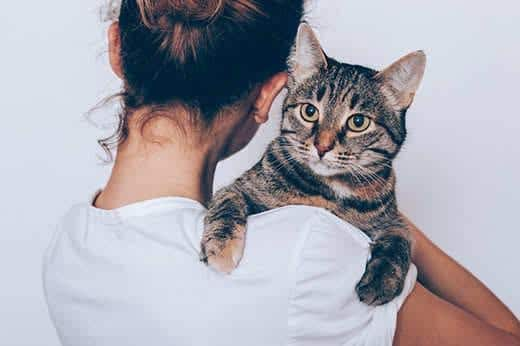


Tasty Tips
Scratching
All cats, especially a newly adopted cat, need to scratch. Cats scratch to file their claws, mark their territory, stretch their bodies and relieve stress. It's not unheard of for cats to scratch furniture, walls and other inappropriate places. Because of this, many new pet parents find themselves returning a cat to a shelter to save their belongings.
Plan for this normal behaviour. Cats tell you what they prefer, from vertical upholstery surfaces to horizontal wood or carpet. Cats also have preferred scratch locations. They want their scratch graffiti seen, so locate the scratch object in an attractive spot. Prime locations include near a window, pathway, door or other important cat territories, like the food bowl. Scent the scratch surfaces with catnip and lure your pet to scratch with feather toys.
Make illegal scratch targets unattractive by applying double-sided sticky tape to furniture while locating the legal scratch post nearby until the cat learns the new rules. Inappropriate scratching usually resolves itself if you provide better, more appropriate scratch options. You can even create your own scratching post for your adopted cat.
Health Issues
New pet parents often want to adopt a healthy animal. Not only are sick or injured cats tough to care for, but veterinary bills are an expense many people aren't ready to afford.
Understand the financial responsibilities of getting a cat before ever going to a shelter. Ask whether your new cat has been spayed/neutered, whether they're up to date on vaccinations and what other issues to expect to help prevent unexpected financial surprises. You can also consider pet insurance or starting a savings account a few months or years before welcoming a new pet into your family. That way, you won't have to consider returning a cat to a shelter for financial reasons.
Getting Along With Children and Other Pets
Many families want an adopted cat that gets along well with children and other pets. Shelters observe a cat's temperament prior to adoption, but stress and the artificial environment of a shelter make it hard to get an accurate assessment of a kitty's personality. Look for cats with a history of living with other animals or people. The important personality characteristics to consider often depend on who's in your household, such as large dogs or small children. Patience is key. Cats can take weeks to adjust to new people, places and pets.
Many cats also won't want to meet anyone new until they feel safe in their environment. Let your cat decompress in one room, away from kids and pets, for at least a week. That gives the cat a familiar, safe retreat while meeting other pets with sniffs and paw pats under the door. Next, give the new cat a chance to check out the rest of the house while other pets and kids are elsewhere. Once they're introduced to all the best hiding spots and perches, cats become more willing to meet new family members.
An adopted cat wants to control their interactions. Strangers might scare them. Ask kids, partners and visitors to sit on the ground and pretend to ignore the cat. Let the new pet approach — or not. Avoid touching the cat until they approach on their own and ask for pets by gently headbutting. Scent rules your cat's life, and these cheek rubs mark furniture and your ankles as safe. Not all cats enjoy lap-sitting, but they share safe-smelling scents by grooming each other and rubbing against those they trust. It takes time, but that headbutt on your shin is a sure sign your new cat accepts you as a trusted friend.
Housing Restrictions
Cats may be returned to shelters because of changes or misunderstandings in apartment pet restrictions. If you rent or are relocating to a new property, check with your landlord about having a cat. If you know their pet policy ahead of time, it will help you decide if it's the right new home for you and a future cat. That way, you avoid the heartbreak of returning a cat to a shelter because you misunderstood the rules.
There are other reasons people return cats to shelters, but these are the most common ones. A little research and patience can go a long way when making your home comfortable for your new cat. If they struggle to adapt, don't rush back to the shelter right away. Patience and time to let your cat adjust will go a long way. With the chance to be happy and comfortable, you might find your new kitty is well on their way to being the perfect companion.


Amy Shojai, is a certified animal behavior consultant, and nationally known authority on pet care and behavior. She began her career as a veterinary technician and is the award-winning author of more than 35 prescriptive nonfiction pet books.
Related products

Hill's Science Plan Urinary Health Adult Cat Food with Chicken supports the health of the whole urinary system. Suitable for sterilised cats.

Hill's Science Plan Oral Care Adult Cat Food with Chicken contains clinically proven kibble technology to reduce plaque & tartar build up.
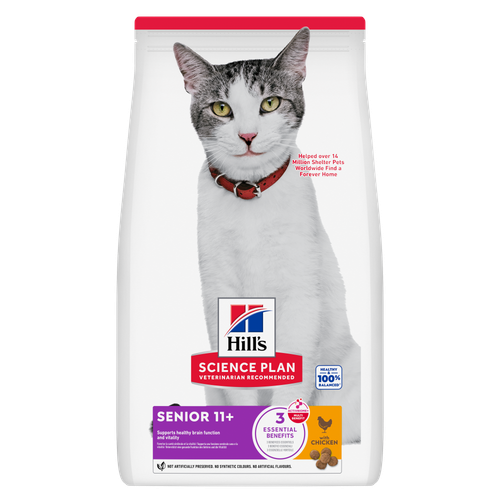
Hill's Science Plan Senior Cat Food with Chicken is a complete pet food, specially formulated with ActivBiome+ Multi-Benefit Technology.
This food supports healthy aging during the golden years. Contains a special ingredient blend to help keep older cats agile, more alert & interactive.

Hill's Science Plan Sterilised Cat Mature Adult Cat Food with Chicken is specially formulated with ActivBiome+ Multi-Benefit Technology. It is a precisely balanced nutrition tailored to meet the needs of mature adult sterilised cats, ages 7+, and to promote graceful ageing.
Related articles
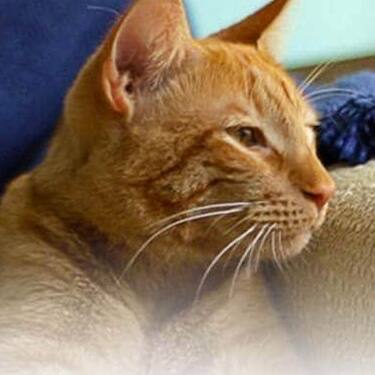
Find the right Hill
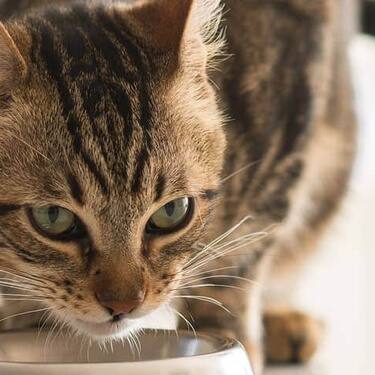
Discover what you can do to spot and support a sensitive cat stomach. See what routines and food you can implement to help your cat be happy and healthy.
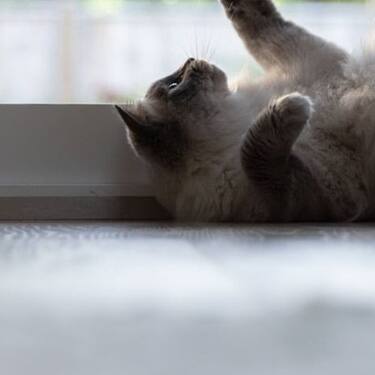
Feeding time can be a wonderful bonding opportunity for you and your cat. Find out how to make the most of it and create a healthy habit with HIll's Pet UK.
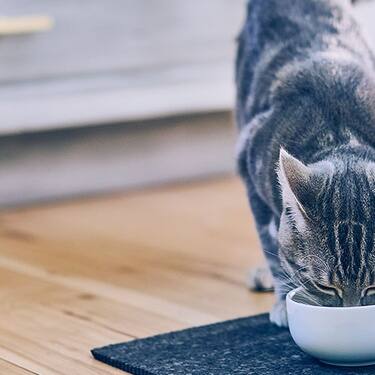
Good nutrition is about the right balance of nutrients. Learn more about health issues when feeding a cat food that has an improper nutritional balance from your friends at Hills Pet Nutrition.

Put your cat on a diet without them knowing
Our low calorie formula helps you control your cat's weight. It's packed with high-quality protein for building lean muscles, and made with purposeful ingredients for a flavourful, nutritious meal. Clinically proven antioxidants, Vitamin C+E, help promote a healthy immune system.
Put your cat on a diet without them knowing
Our low calorie formula helps you control your cat's weight. It's packed with high-quality protein for building lean muscles, and made with purposeful ingredients for a flavourful, nutritious meal. Clinically proven antioxidants, Vitamin C+E, help promote a healthy immune system.

